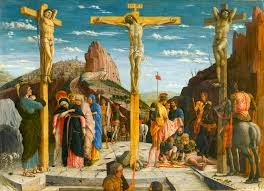Septuagesima Sunday
But we are still called to give it our all. St. Paul reminds us that we should run so as to win, and train our bodies for victory, which means denying them things that keep us from winning. And it means taking things that help us win.
Since June, at the advice and with the occasional help of a friend, I’ve been working out pretty much every day Monday through Friday (though, I will admit, I didn’t quite work out while on vacation). I recently had a doctor’s appointment and he noted that, as far as the bloodwork I had done is concerned, I’m doing much better, especially considering that the blood was taken not that long after Christmas, with all of the goodies associated with it. I may not be swoll (the Troopers at the State Police Post where I work out often say I’m doing my “holy gains”), I am getting a bit stronger.
To do that I have to stick with it, day in and day out. I also have to be more careful what I eat. That includes not eating as much frozen pizza, but also adding good calories that helps my body grow stronger. It isn’t always fun to go to the Post for “holy gains,” and the bulking powder I mix isn’t always a delicious, refreshing beverage. But it helps me, little by little, to keep my body fit and lean.
The same is true in the spiritual life: we cannot stop (not even for vacation) our desire to grow in holiness and the actions we take each day to develop our relationship with Christ. The prayers that we say, the foods from which we fast or abstain, the little mortifications that we endure are all meant to help us train to be winners and to receive the crown of heaven from our Lord. Some days we enjoy those things, or we notice the difference that those ascetic practices are making in our spiritual life. Other times we seem to be the same, unfit person that we were when we started. But the key is to persevere.
Another key is not to make too many comparisons. Certainly we can look to others as guides, especially the saints. They help us to know how we can grow in our love of God and neighbor. To continue the analogy I began earlier, the friend that I occasionally work out with is much stronger than I am, and you can see it clearly in his biceps. Desiring to be stronger like him can sometimes push me to workout, even when I don’t want to.
But, on the other hand, comparisons can also be less than helpful, because we’re not concentrating on our own pilgrimage, but get caught up in what others have and do. That’s one of the messages of the Gospel today. The landowner promised a certain pay to those who worked all day. He even promises those who started a little later than the first laborers a just wage. But when he distributes the pay, those who came last, who only worked a couple of hours, received full pay. The first workers starting looking at others, and comparing their work to those who came at the end of the day, and assumed they would get more. But they received what they were promised, no more, and no less. Their comparison did not help them, but actually drew them away from the goal, which was to work well for the landowner.
So in our spiritual life, when we look at what others are doing, sometimes it does not lead us to imitate others’ greatness, but makes us jealous of what they have, and unsatisfied with what we have. Maybe we feel like we’re doing a lot of work, praying a lot, fasting and abstaining a lot, doing those mortifications, big and small, that are supposed to make us holy. And all it’s doing is making us look down our noses at those other people who don’t practice the same penances that we do. Or maybe we see what others do, and we feel like it’s hopeless, like our spiritual muscles will never be as big as that other person’s.
God doesn’t want our negative comparisons. He wants us to be who we are, not someone else, and cooperate with Him in growing in holiness, according to our own state in life, graces and temptations, and abilities. He doesn’t want us to be Martha, comparing what we are doing to what Mary is doing. He simply wants us to be Mary, attentive to Him and following His direction for our life.
It’s also important to note how merciful the justice of God is. As I said earlier, the landowner promised to give what was just to those who worked in the morning. But out of a desire for others to be a part of the great work, he pays the later workers the same as the earlier. There’s no evidence in the parable that the later workers knew they would be paid the same as the earlier workers. But they were. God’s justice was colored with His mercy. God was generous. And so he is with us. God is always looking to forgive us, to draw us closer to Him, even in the last moments. Think of the good thief, St. Dismas, who at the last moments of his criminal life sought the mercy of God, and it was granted to him, like to the later workers. So for us, even if our conversion has come late, or even if we’re still working on the conversion we know God wants for us, we should never despair of God’s mercy. Neither should we presume on it, and wait until the last moments of breath to make a true conversion, but if we are doing what we can to grow in living a life like Christ’s, we know that God will reward that, not only justly, but abundant with mercy.
So, as we get closer to Lent, and are starting to think of the Lenten penances we can take on, let’s follow the advice of St. Paul and do the things that will help us truly convert our lives, not make Lent a Catholic 40-day diet. Choose a penance that will help you be a winner! But, also know and trust in the mercy of God, who desires heaven for all His children, so they can rest eternally with Him, the Father, the Son, and the Holy Spirit. Amen.


